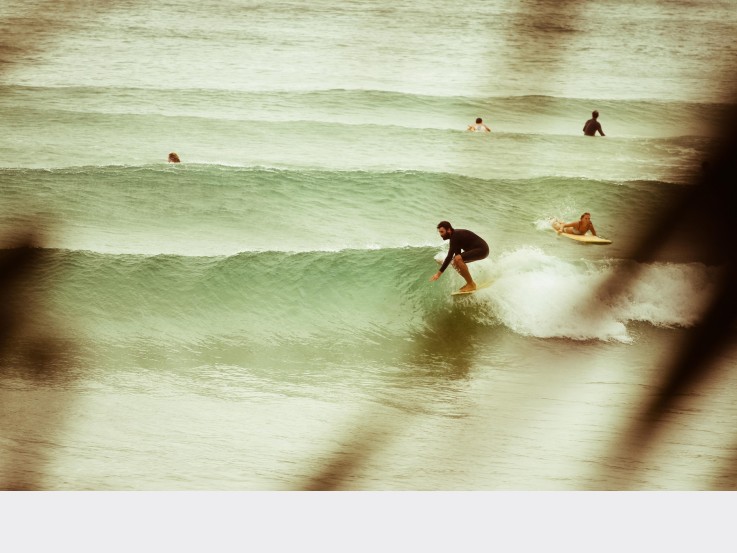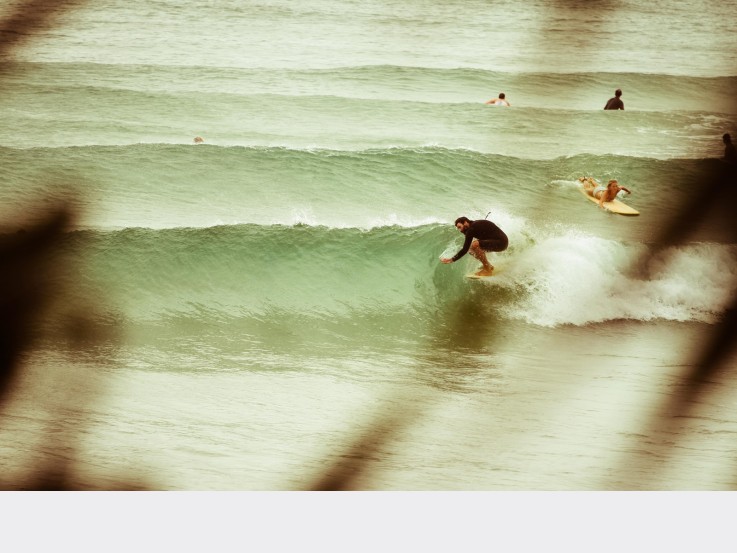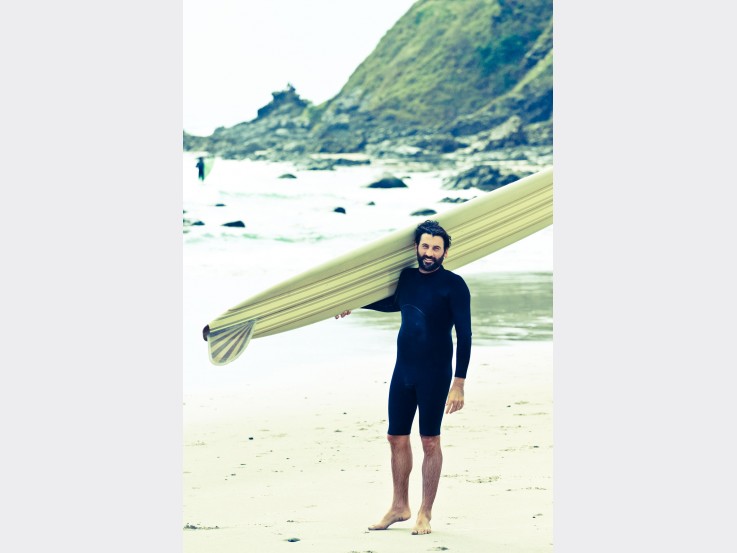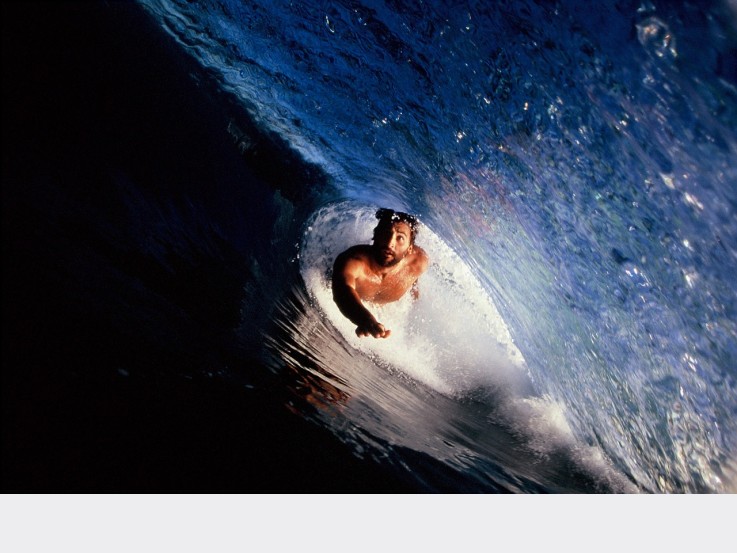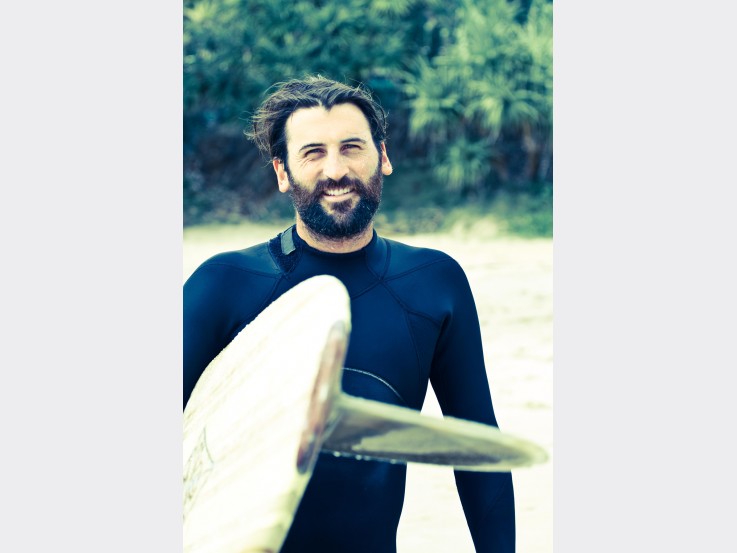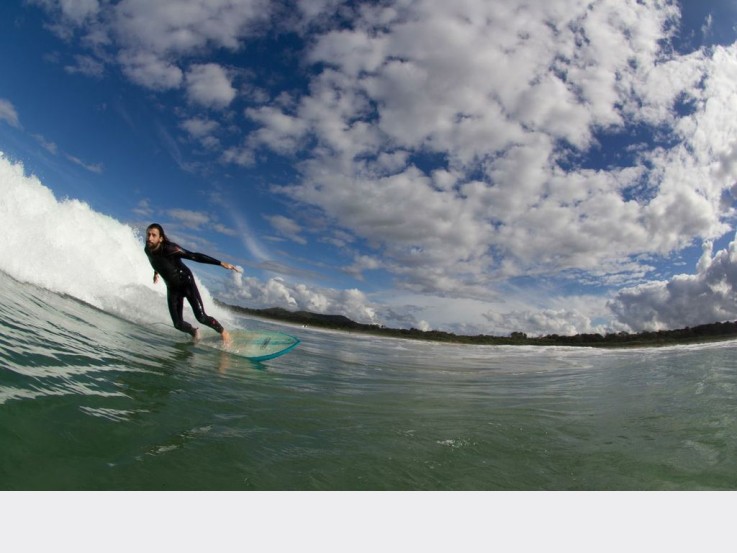Tim Silverwood - Environmentalist
When did you get your first surfboard?
I was given a chunky ‘Goanna’ thruster when I was about 10 but I never actually learnt to ride it. I rode a bodyboard exclusively for my entry into wave-riding from the age of 10 to about 20. By the time I’d turned 20 most of the hardcore bodyboarders I grew up with on the Central Coast were getting pretty sick of not being able to surf on small days so we all started turning to mals, single fins and twinnies. That’s when I realized there was a whole new world of wave riding I’d neglected and I’ve never turned back.
What was the feeling you had when you first stood on a surfboard?
Going from being a committed bodyboarder used to throwing myself over rocky ledges it was a pretty strange switch to riding a longboard on slow point breaks but I totally fell in love with the stoke and the serenity. I learnt to ride a longboard properly at places like Point Plomer with seemingly endless rides, golden sunsets and dolphins sharing your wave. I learnt to love the glide as opposed to the hunger for power I’d chased riding a boogie.
What do you love about surfing?
Everything. I’m obsessed with glide and trim, the feeling when the wave, your craft, your timing and skill all align to create this perfect harmony. I mix up my wave riding experiences to include logs, mid-length single fins, twinnies, eggs, shortboards, bodysurfing, hand planning and most recently an addiction to riding finless craft. The glide keeps me entertained but it’s the meditative experience I get when I surf that keeps me coming back for more. I can have so much work to do and so much stuff on my mind but when I go for a surf I can feel it all get washed into the background with the first duckdive or bottom turn. I don’t think the true value of surfing and the benefits to human health have been portrayed accurately. I meet plenty of people in Sydney who invest heavily in meditation courses, fancy yoga retreats and therapy but I don’t need any of that because I have surfing.
What was your most memorable wave?
Tough question. I love so many sessions. I’ll go back my learning sessions at Point Plomer and a wave I remember where a pod of dolphins rode along aside me. One dolphin was so close to my board and had its body on its side looking up at me. I believe that dolphins ride waves for multiple reasons but one of them has to be for fun. At that moment there was a beautiful connection between two surfers from completely parallel universes.
Who did you look up to and admire when you were a grommet?
Being a bodyboarder it was guys like Mike Stewart who I still admire as an incredible waterman. When I got hooked on surfing it became crew like the Malloy Brothers, Machado, Rasta, Tudor, Occy, Dorian, Slater and Parko. I have a real admiration for surfers who use their position to be a role model for good causes, I think what Rasta has done for surfing and marine conservation is exceptional.
Who/what inspires you?
Funny how these questions roll into each other haha. Rasta is an inspirational figure who actually became a catalyst for my own activism after I met him in 2009 when he was mid way through his Transparent-Sea voyage sailing/ kayaking from Byron to Bondi. I resonate with many people who have made a personal decision sacrificing the ‘easy road’ to pursue a cause they believe in.
I am incredibly inspired by the immense challenges we face. Many people get overwhelmed by how hard the journey towards a future ‘sustainable’ relationship with the earth is, they clam up and feel paralysed by it. I have the ability to acknowledge the seriousness of the situation and the immense challenges but focus on the small steps in the right direction. That’s not to say I don’t get deeply concerned and stressed when things move backwards but I figure you have to work on the positives and just ensure that we head in the right direction.
What is the greatest thing you have learned in your life?
I watched the kids film ‘The Lorax’ last night and the moral of the story to all the citizens of the world is quite simple: “Unless someone like you cares a whole awful lot, nothing is going to get better. It’s not.” It’s safe to say that all great changes in time have been spearheaded by people or creatures that felt an immense need to ‘change’ things and make them better. There’s a great quote that I believe goes back to Native American text that reads, “We are the people we have been waiting for.” That really resonates with me. People need to quit acting like someone else is going to be our saviour and make everything better. Stuff that, we are the people who can set things straight or at least start the change-making process. It’s our obligation to do it NOW so that future generations don’t have to pick up more pieces of the broken puzzle that we created.
Do you have any regrets or wish you had done something differently?
Not really. I firmly believe if you follow your heart and make decisions that are true to your gut instincts then you’ll end up on the right path or at least the one you were ‘meant’ to take. I’ve certainly created a challenging path…being an environmentalist is no easy gig, especially when you live in one of the most expensive cities in the world but I’ve learnt to adapt and live with little. We all know the expression that ignorance is bliss and I certainly think about that and the fact that if I hadn’t been brought up in a wonderful home in the bush with a family that cared about the environment then things could be very different. If I wasn’t a surfer then perhaps I never would have become passionate about ocean conservation. You can’t forget how lucky we are that we are born into such privilege as people of the ‘first world. I’m ecstatic that I have the knowledge, the power and the desire to try and change something that I don’t like.
What are you most proud of?
That I chose this path and am going to stick with it.
Of all the places you have travelled to, what place in particular stands out? And why?
In 2007 I did a 10 month shoestring trip from Bali to Kashmir to chase waves, snowboard and experience South East Asia. It turned out to be a pivotal odyssey where I learnt more than any other period in my life. I learnt how the bulk of the world’s population live and that what we consider ‘normal’ is so far from normal for most of our species. The most profound moment happened when I was snowboarding in the Himalaya and discovered that all the waste generated by the mountain village was dumped over the side of a pristine mountain.
Watch the footage here:
That was their ‘away’. It shook me to the core, on my journey I’d seen the shocking ocean pollution throughout Indo, SE Asia and India but here I was amongst the tallest, most beautiful mountains on earth witnessing trash (that I had a hand in creating) starting it’s long migration to the sea. I ended up returning to Kashmir for 3 consecutive years and trying to change the situation and film a documentary. I didn’t finish it but still have all the footage and interview so who knows, maybe one day.
What causes and organizations do you support?
In 2009 after I had met Rasta during his Transparent-Sea voyage I was pumped to get out and conduct clean ups with local surfers on the Central Coast. I was introduced to Amanda Marechal (wife of Rex Marechal of RMS surfboards) and Roberta Dixon-Valk who had the idea for ‘Take 3 – A Clean Beach Initiative’. I instantly fell in love with the idea and that it could lead to so many positive behavior changes so jumped right in. We kept things pretty grass roots with the group until 2011 when we won the inaugural Taronga Conservation Society Green Grant (Taronga Zoo) and $50,000 to develop our organization. I was so stoked that we’d won, I knew then that everything was going to be different and that this would cement my commitment to this issue. Around the same time as the announcement I secured the opportunity to sail across the North Pacific Ocean to study and document the Great Pacific Garbage Patch so I ended up quitting my job and pursuing my role as an environmentalist full time. It’s been 2 years now and everything has worked out. Take 3 is on the up and up and I’ve broadened my role in a number of great campaigns and initiatives. I’m involved in the Boomerang Alliance who are responsible for the campaign for a National 10cent refund on bottles and cans, I co-founded ‘Plastic Bag Free NSW’ to try and legislate against plastic bags in the state, I am a founding member of Circular Economy Australia an initiative to educate about truly sustainable consumption systems, I work closely with other groups pushing sustainability agendas and have recently launched a new business with my ever supportive mother called ReChusable that provides sustainable alternatives to disposable plastic products.
What sort of education have you had?
I completed a Bachelor of Science in Sustainable Resource Management at the University of Newcastle.
What is your current job and what does it entail?
I am involved full time in my environmental work that sees me managing Take 3, managing ReChusable, devoting significant time to campaigns I’m involved in, consulting to groups and businesses and visiting schools, communities and business functions to give presentations about my work and solutions to sustainable living. I have a love/ hate relationship with my very unorthodox working day. My day might see me working late into the night, having very early starts and traveling around Australia but at least I have the freedom to go for a surf at hours in the day when the surf in Bondi is less crowded. Honestly, it’s a circus out there at some times of the day!
What’s next for you?
Whilst we have progressed a long way on the issue of plastic pollution in recent years and continue to make positive changes there is an incredibly long way to go. My big passion for the future is to work towards waste avoidance and resource recovery on a big scale. At the very core of so many environmental and social pressures we have created is a very outdated and poorly thought out economy of consumption. If we are going to give humanity and future generations a fighting chance of persisting on the planet then things need to change in a big way. The principles of the Circular Economy appear so fringe at first glance but when you dig deeper you realise that in fact all they represent is common sense. Take a surfboard for example. The current model is very linear; we take, we make then we dispose. In this case we use chemicals derived from oil and gas to produce a board using energy from fossil fuels. In the manufacture process there will be waste created and in most cases the board itself will become waste after a few months or years. The resources in that board will rarely ever be recouped, they will persist somewhere in the biosphere forever. It’s not hard for me (call me a visionary) to imagine a surfboard built using Circular Economy principles where the board itself would be produced from a locally sourced renewable timber or recycled expanded polystyrene recouped from packaging (eg. from around the fridge someone just bought or an old surfboard), laminate could be made from plant based biodegradable resin that could be composted if the board died, cloth could be made from recycled materials, the energy used to make the board could come from renewable solar energy, all waste during manufacturing could be recycled into future boards and other associated energy inputs could also be from renewable sources. I know the above seems like a challenge to the mind and that’s because it is. But some board manufacturers are already adopting them, Waste to Waves collects waste styrofoam to make recycled EPS blanks and pioneers like Tom Wegener and Kevin Cunningham have realized the problem and are working on sourcing sustainable materials for their surf craft.
Try expanding the ideals out to all avenues of consumption and you start to see how big and how challenging but also how exciting this new model of consumption could be. The key here is not to think this is something that is going to happen overnight and that a business is required to adopt all the principles. We just need to acknowledge that we live in a world of finite resources and that the result of our previous model clearly has its flaws (depleting oil reserves, an altered climate and an ocean full of plastic to name a few). The amount of waste we create is obscene and whether we like it or not we’re going to have to change our ways to accommodate a world of less. The sooner the better I say.
Listen to Tim's interview with ABC here
Where can we find you online?
Posted by: Troy Roennfeldt, on June 13, 2013
Categories: Interviews
Latest Posts
Craig Sims - White Horses & Surfing Life Publisher
Luke Kennedy - Editor of Tracks Magazine
Simon ‘Swilly’ Williams - Surf Photographer
Jarra Campbell - the Bondi Alchemist
Greg Gordon - Owner of CR Surf
Shayne Nienaber - Surf Photographer
Alexa Hohenberg - Owner of Still Stoked
Christine Deveney - TapaReef Owner & Creator
Russell Ord - Surf Photographer
Richard Kotch - Surf Photographer
Categories
Interviews
Articles
Videos
Press Releases
Quiz
Archive
December 2018
November 2018
October 2018
September 2018
August 2018
July 2018
June 2018
May 2018
April 2018
March 2018
February 2018
January 2018
November 2017
January 2017
December 2016
November 2016
October 2016
September 2016
August 2016
July 2016
June 2016
May 2016
April 2016
March 2016
February 2016
January 2016
December 2015
November 2015
October 2015
September 2015
August 2015
July 2015
June 2015
May 2015
April 2015
March 2015
February 2015
January 2015
December 2014
November 2014
October 2014
September 2014
August 2014
July 2014
June 2014
May 2014
April 2014
March 2014
February 2014
January 2014
December 2013
November 2013
October 2013
September 2013
August 2013
July 2013
June 2013
May 2013
April 2013
March 2013

